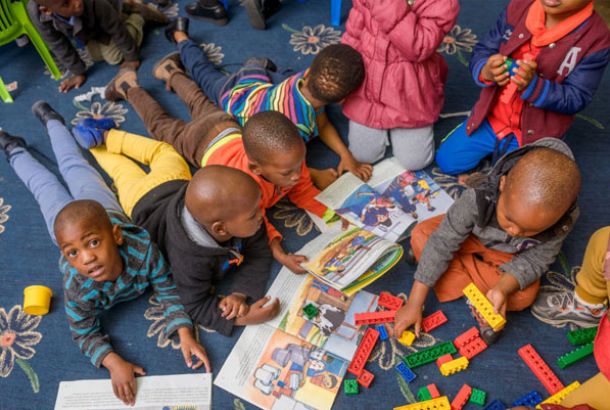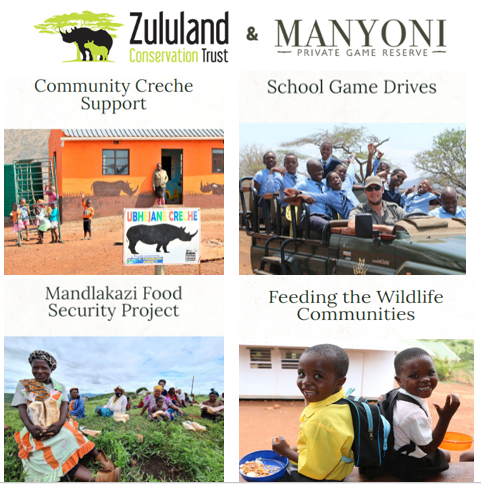Zululand Conservation Trust
Manyoni Private Game Reserve implements a number of conservation initiatives that focus on the protection of threatened and endangered species. Hand-in-hand with our conservation work, through our support of the Zululand Conservation Trust, we endeavor to implement programs that uplift our local communities and involve them in our conservation efforts.
Zululand Conservation Trust
Manyoni has partnered with the Zululand Conservation Trust, a non-profit organisation focused on people and conservation. Not only do they support Manyoni but the whole Zululand region. The ZCT funds a wide variety of projects through generous donations from individuals, businesses and organisations, as well as their own fundraising events. All of the funding is focused on two main types of projects:
- Community upliftment, with a keen focus on the betterment and empowerment of communities surrounding nature reserves through food security programs, educational initiatives and supporting communities with their basic necessities where possible.
- Conservation of endangered species, specifically Wild Dog, Black Rhino and White Rhino. The conservation projects also include the Zululand Rhino Orphanage which opened its doors for orphaned rhinos in 2017 due to the increase in poaching in the Zululand area.
The ZCT has established amazing community projects in line with our people and conservation goals, in addition, they support the reserve with essential equipment for our wildlife monitoring & protection. Check out their website and get involved! https://zululandconservationtrust.org/
Endangered Species Reintroduction
In August of 2009, Manyoni Private Game Reserve introduced a founder population of four cheetahs (two males and two females). While officially classified as Vulnerable by the IUCN there is a strong push amongst conservationists to increase the classification to Endangered. In South Africa, there are only an estimated 1000 cheetahs. Since the introduction in 2009, we have continued to manage the cheetah population and introduce new animals for genetic variation. With the birth of new cubs in the reserve recently, the population is now estimated to be at 25 individuals. The cheetah re-introduction has been a tremendous success and we are now in the position to contribute to the metapopulation by moving cheetahs to new reserves.
The 1st of May 2015 marked an exciting and significant day for wild dog conservation in the KwaZulu-Natal region, as well as for the history of Manyoni Private Game Reserve, with the introduction of our first pack of African wild dogs. Classified as endangered, and with only 39 distinct sub-populations, there are estimated to be only 3000-5000 wild dogs left in the world.
Unfortunately, Manyoni currently doesn't have wild dogs in the park and we are actively working on a solution to introduce a new pack. Read up more on the Wild Dog situation here.
In addition to endangered species, the reserve has supplemented the population of two different species under local population pressure in our area. In January 2005, eleven leopard tortoises were introduced into the reserve to supplement our population. Tortoises are often picked up along roads or in rural areas and kept as pets, and the project was implemented to return leopard tortoises that had been surrendered to a rehabilitation centre to their indigenous habitat. In August 2007, we introduced 50 Red-billed Oxpeckers. Arsenic, organochlorine and organophosphate cattle dip negatively impacted Oxpeckers as both Yellow-billed and Red-billed Oxpeckers approached local extinction in the first half of the 20th century. The aim of the project was to introduce Red-billed Oxpeckers to supplement the existing small population within the reserve. The population has increased substantially since release and juvenile birds are being seen more regularly which is a good indicator that they are breeding successfully.
Rhino Management
Black and white rhinos have both faced extinction in the past two centuries due to poaching, habitat destruction and inadequate security resources, particularly in unfenced areas. Their numbers only increased due to considerable conservation efforts and translocation programmes.
Sadly however, these majestic giants are again facing an onslaught due to a dramatic increase in poaching over the last few years. This is fueled by the Asian demand for rhino horn which is falsely believed to have medicinal properties. The first peak in rhino poaching in South Africa from the start of the 21st century was in 2008 with 83 rhinos poached. 2009 saw a 46% increase with 122 and 2010 had a shocking 173% increase with 333 rhinos poached. The poaching continued to escalate in 2011 and 2012 with 448 and 668 rhinos poached respectively and from 2013 we have continued to lose over 1000 rhinos per year.
The Manyoni Private Game Reserve has a vital population of white and black rhinos that is monitored on a daily basis to ensure their well-being and safety. In addition to our security force, the reserve has dedicated rhino monitors that patrol the reserve. This is a crucial exercise that allows the reserve management team to keep records that allow them to protect, manage and monitor the rhino population. The largest problem we face in monitoring all the rhinos is that they are difficult to individually identify. The most effective method of being able to mark these animals is to notch the ears and microchip each individual animal. These microchips allow SAPS to link the horn to the poached therefore improving prosecutions.
In 2015 Manyoni Private Game Reserve took a drastic step and decided to dehorn our entire rhino population when year after year we increased rhino security but continued to lose rhinos to poaching. After evaluating all other alternatives and weighing up the pros and cons, we came to the decision that it was the best way forward to protect our rhino population. We have invested heavily in security and will continue to do so and dehorning is only one of the many facets of protecting our wildlife. The conservation team has worked tirelessly and successfully completed this huge undertaking. The horns have been moved to a safe storage facility off the reserve. This is not the solution to the problem, as we are well aware, but we believe that we have taken the best decision to protect our rhinos under these circumstances. In order to offset some of the costs involved in our Rhino Management Programme we offer guests the opportunity to participate and assist in the dehorning procedure. For more information please watch the video below or contact
Latest Articles

Club Med: the catalyst KZN needs

DoMore Foundation

